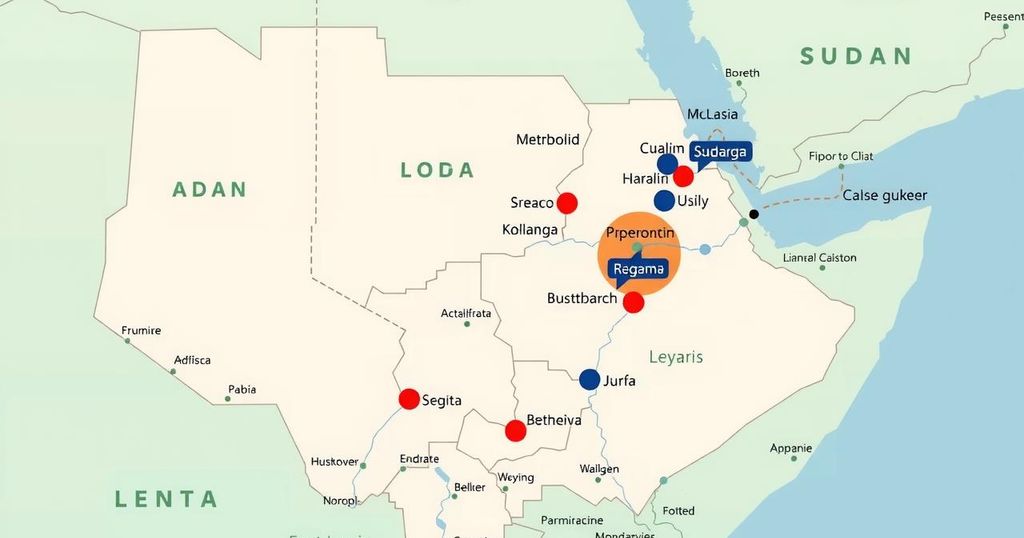The UAE is accused by Sudan of complicity in genocide via support for the Rapid Support Forces (RSF) amidst a civil war. Its interests include resource extraction and political influence, with historical ties to military activities in the region. Despite allegations, the UAE denies involvement and will challenge the ICJ case, anticipating reputational damage yet sustained protection from significant consequences.
The ongoing civil war in Sudan has prompted the nation to accuse the United Arab Emirates (UAE) of complicity in genocide, as per a filing with the International Court of Justice (ICJ). This accusation shines a light on the UAE’s alleged backing of the Rapid Support Forces (RSF), which have been in conflict with Sudan’s regular army for almost two years, a claim the UAE vigorously denies.
Historically, Sudan has been viewed as a pivotal country for the UAE due to its abundant natural resources, including agricultural land, gas, and gold. Situated near Libya—where the UAE supports rebel factions—and possessing a coastline on the Red Sea, Sudan is strategically important for oil transport and resource extraction. Since the coup in 2021 that saw General Abdel Fattah al-Burhan seize power alongside RSF commander Mohamed Hamdan Daglo, the dynamics in the region have significantly shifted.
Experts note that the UAE’s primary interest in Sudan revolves around political influence and investment opportunities in its natural resources and trade. The UAE seeks these resources, particularly minerals and arable land lacking in its own territory, as confirmed by researcher Hamid Khalafallah. The UAE has recently been identified as a major gold trading hub, with a significant portion of African gold exports allegedly smuggled into the country facilitated by the RSF.
Notably, Abu Dhabi’s objectives also include countering Saudi influence in Sudan and mitigating the spread of political Islam, which it perceives as a security threat. Historical ties between the UAE, Sudan, and Saudi Arabia stem from their shared military cooperation in Yemen’s civil war, where both the Sudanese army and the RSF received support.
Amid these alliances, disagreements have surfaced between Saudi Arabia and the UAE regarding support for Daglo, an action perceived as challenging Saudi aspirations. Ideologically, the RSF aligns with the UAE in repressing political movements like the Muslim Brotherhood, contrasting with the Sudanese army’s connections to remnants of the prior Islamist regime.
With accusations of war crimes against both factions during the conflict leading to significant casualties and displacement, the RSF was specifically targeted by U.S. claims of genocide related to ethnic violence. Concurrently, U.S. lawmakers highlighted the UAE’s alleged continued military support for the RSF despite prior assurances.
Recent reports illustrate that Daglo’s financial operations are interlinked with the UAE, with the RSF purportedly receiving military support from the UAE, including arms supplies. In reaction to the ICJ filing, the UAE characterized it as a “publicity stunt” while preparing to contest the case.
Despite the ICJ’s ruling being binding, the authority lacks enforcement capabilities. Observers predict that although the case may damage the UAE’s international reputation, its significant political and financial influence could mitigate any serious consequences.
In conclusion, the UAE’s complex involvement in the conflict in Sudan entails allegations of complicity in genocide and support for the Rapid Support Forces amidst a broader geopolitical struggle in the region. The UAE’s vested interest in Sudan’s natural resources, combined with historical ties to military operations against shared adversaries like political Islam, shapes its actions. While facing accusations at the ICJ could tarnish the UAE’s reputation, its substantial political clout may offer protection from substantial repercussions.
Original Source: www.hindustantimes.com






